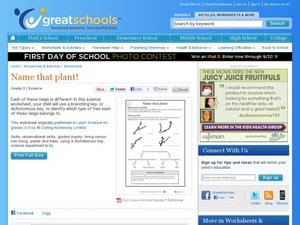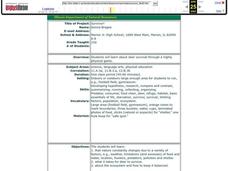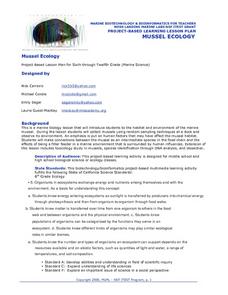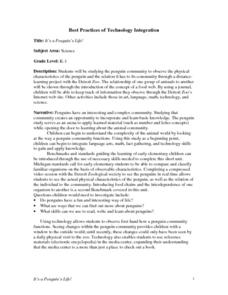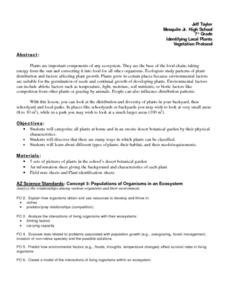Chicago Botanic Garden
The Carbon Cycle
There is 30 percent more carbon in the atmosphere today than there was 150 years ago. The first lesson in the four-part series teaches classes about the carbon cycle. Over two to three days, classes make a model of the cycle, add missing...
Science Matters
Lotusland
It's time for a field trip! Scholars take their new-found knowledge of adaptations and seed dispersal on a field trip to a local botanical garden. They gain an up-close look at how ecological interdependence works in a distinct...
Science Matters
Mighty Microorganisms
How can you tell if a microorganism is helpful or detrimental to an ecosystem? Learners inspect slides or pictures of microorganisms and record their observations to identify those that are beneficial or harmful. They then pretend to...
Curated OER
Name that plant!
What is a dichotomous key? When your kids ask, hand them a learning exercise like this one, to explain it. They use the key to identify four different trees, based on the budding twigs they've produced. Tip: Have learners extend this...
Curated OER
What A Tangled Web We Weave
Learners of many ages discuss how all organisms rely on other organisms for their survival. They construct a food web and energy pyramids, and write an informative essay about the food web that they have designed.
Curated OER
Introducing Habitats and Biodiversity
Students identify habitats in Arizona. Theys define and illustrate a food web, and explain the importance fo biodiversity.
Curated OER
Keys and Webs
Students explore and classify organisms found in a Rocky Mountain Ecosystem. Through discussions, students examine the effects upon an ecosystem if a component was removed or a new component was added. As a class, they survey reasons...
Science Matters
Island Fox Outreach
Off the coast of California lives a wild animal called the Island Fox. Experts discuss the importance of the Island Fox to the Channel Islands and the balance the fox creates within its ecosystem. The lesson concludes with a reading of...
Curated OER
Food Safety-Consumers Need the Facts
Learners begin by completing a survey asking them to rank their concerns about commercially prepared foods. They develop a definition of relative risk, and complete the "Pro or Con" worksheet. Students work in groups to make a study of...
Curated OER
Tracking Ocean Ecology
Students look at the data maps given to them about how chlorophyll affects the algae blooms and make predictions about the harm they will cause. In this data maps lesson plan, students manipulate data sets from the website.
Curated OER
Survivor!
Students play a game in physical education class to examine how a deer survives. Using nature as a guide, they discover how it is constantly changing due to weather, food, water, pollution and predators. They discuss the characteristics...
Curated OER
In the Company of Wild Butterflies
Learners discover the life cycle of a butterfly and explain the different stages. For this exploratory lesson students watch a video and create insect art and they will get an opportunity to view live specimens of butterflies.
Curated OER
Empty Oceans
In groups of four, pupils brainstorm about seafood. They view the Monterey Bay Aquarium Seafood Watch website to examine the problems caused by the seafood industry. Learners are then brought back together to discuss what they...
Curated OER
Seed Dispersal
Students explore seed dispersal by designing their own wind dispersed seed structure. Using one piece of paper and a box fan, they construct a seed dispersal structure, record the distance their seed travels, and answer discussion...
Curated OER
Whales
First graders investigate two different types of whales; toothed and baleen. They describe what the different types of whale eat. They listen to a cassette of Dyan Sheldon's, The Whale Song before making stick puppets to dramatize the...
Curated OER
Mussel Ecology
Students are introduced to the marine environment of the mussel. The emphasis of the lesson is upon what human factors are present to influence the environment in positive and negative ways. They brainstorm in groups in order to conduct...
Curated OER
What Should I Know about Biosphere?
If your class is learning about the biosphere, you may find a study guide or reading guide helpful. Focusing on vocabulary, processes, and interactions, the Word document is easy to edit as needed to fit your needs. Another great option...
Curated OER
Plant Diversity and Distribution
Learners construct a defined plot on school grounds and observed patterns in plant life. They count trees, shrubs, cacti and record on a data sheet. They compare data and generate a plant diversity overlook for their school.
Curated OER
It's a Penguin's Life!
Students will be studying the penguin community to observe the physical characteristics of the penguin and the relation it has to its community through a distance learning project with the Detroit Zoo.
Curated OER
Illinois Biodiversity
Students examine the amount of biodiversity in the state of Illinois. They practice using new vocabulary and listening to stories about animals. After given time to reflect, they write their own haiku. They work together to create a...
Curated OER
U.S. History: Antebellum Heroes and Villains
Eighth graders research and write reports on key figures of the Antebellum Period. The projects also include pictures, bibliographies, and timelines about their assigned figure. In addition, 8th graders present oral reports to classmates.
Curated OER
Mountain Lions in Arizona Overview
Here is an overview to a unit on the mountain lions of Arizona. Six different lessons take youngsters on a complete investigation of the adaptations, diet, population density, and management of these beautiful wild cats. Each of the...
Curated OER
Human Impact Starts with?
What kind of effects do humans have on their environment? Review key anthropogenic vocabulary with a fill-in-the-blank handout. You may wish to use this as an ongoing glossary, review before a test, or even create a crossword puzzle or...
Curated OER
The Great Pond Safari
Students study pond life by visiting a pond and completing an associated worksheet. They play an online game based on the pond learning experience.
Other popular searches
- Desert Food Chain
- Animal Food Chain
- Deciduous Forest Food Chains
- Pond Food Chain
- Ocean Food Chain
- Frog Food Chain
- Food Chains in Biomes
- Arctic Food Chain
- Desert Animal Food Chain
- Ocean Animals Food Chain
- Coral Reef Food Chain
- Marine Science Food Chain





